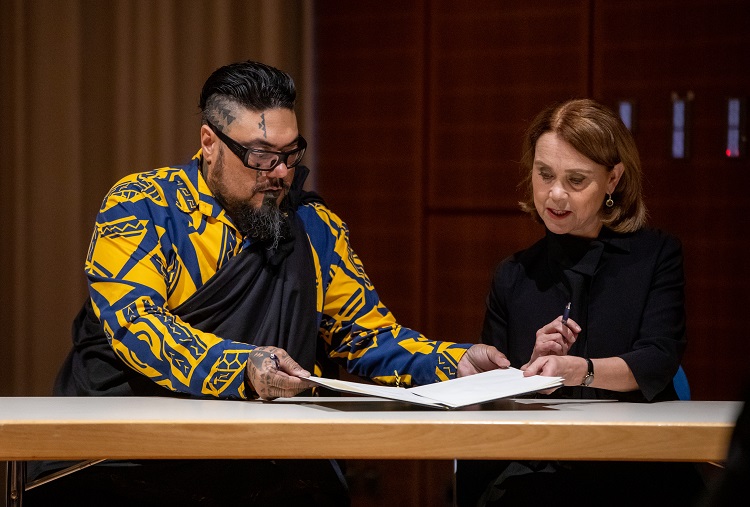Ceremonial repatriation of human remains to Hawaii
Freiburg, Apr 06, 2023
On behalf of the state of Baden-Württemberg, Minister of Science Petra Olschowski presented human remains from two institutions to a delegation from Hawaii in a ceremony at the Natural History Museum in Stuttgart on April 5, 2023. The representatives had traveled to Germany to receive the human remains of a total of 19 persons of Hawaiian origin. Of these, 13 Iwi Kūpuna were in the Alexander Ecker Collection at the University of Freiburg. The political scientist Prof. Dr. Andreas Mehler, who organizes the accompaniment of the Freiburg provenance research by African scientists, represented the University at the ceremony.
 Mana Caceres (Hui Iwi Kuamo'o) and Petra Olschowski (Ministry of Science, Research and the Arts of the State of Baden-Württemberg) at the ceremony in the State Museum of Natural History in Stuttgart. Photo: Christoph Schmidt
Mana Caceres (Hui Iwi Kuamo'o) and Petra Olschowski (Ministry of Science, Research and the Arts of the State of Baden-Württemberg) at the ceremony in the State Museum of Natural History in Stuttgart. Photo: Christoph Schmidt
Rector Prof. Dr. Kerstin Krieglstein reiterated the clear position of the University of Freiburg: "We are appalled by the crimes that were committed during the era of colonialism, also under the guise of science. Their effects are still painfully felt today by those affected and their descendants. Of course, we will hand over the mortal remains to the delegation so that they can be buried in their motherland in accordance with Hawaiian culture." The University of Freiburg had already previously restituted remains from the collection: in 2014, human remains of 14 people were returned to Namibia, and in 2019, the remains of eight people were returned to Australia.
The unlawful acquisition of human remains is one of the dark chapters in the history of European science. The University of Freiburg is facing up to the critical reappraisal. Among other things, the project “Reciprocal, Interdisciplinary and Transparent: Provenance Research with a Restitution Perspective in a Colonial Context - On the Appropriate Handling of a Collection of Human Remains Using the Example of the Alexander Ecker Collection in Freiburg” is making an important contribution to this. The research project, supported by the University and the Arnold Bergstraesser Institute, has been investigating questions of provenance and the handling of human remains since May 2021. Andreas Mehler shares the leadership with Prof. Dr. Dieter Speck, University Archives, and Ursula Wittwer-Backofen, Professor of Biological Anthropology at the University of Freiburg.
The focus is on the remains of about 120 people from all over Africa. "To this end, we are collaborating with researchers from different disciplines and regions of origin in Africa," Mehler emphasizes. "So far, there is hardly any empirical data on such a transdisciplinary as well as intercultural approach." The scientists will present their results at the end of April 2023. This includes using the concrete example of the Freiburg collection to develop best practice recommendations in cooperation with populations of origin and researchers from former colonies. The policy will focus on questions of research ethics and the purposes of science.
The collection was originally established in 1857 by Alexander Ecker, a Freiburg anatomist and anthropologist. It consists of human remains and casts acquired through donations, exchanges, and purchases. In 2001, the Alexander Ecker Collection was taken over by the Freiburg University Archives and the Uniseum. Since then, it has repeatedly been the subject of critical debate in research and teaching.
Press release from the Ministry for Science, Research and the Arts Baden-Württemberg

